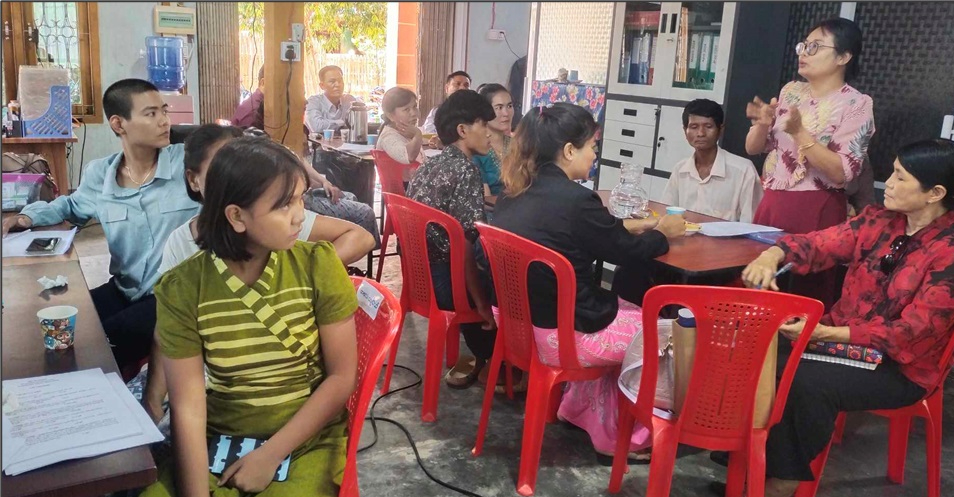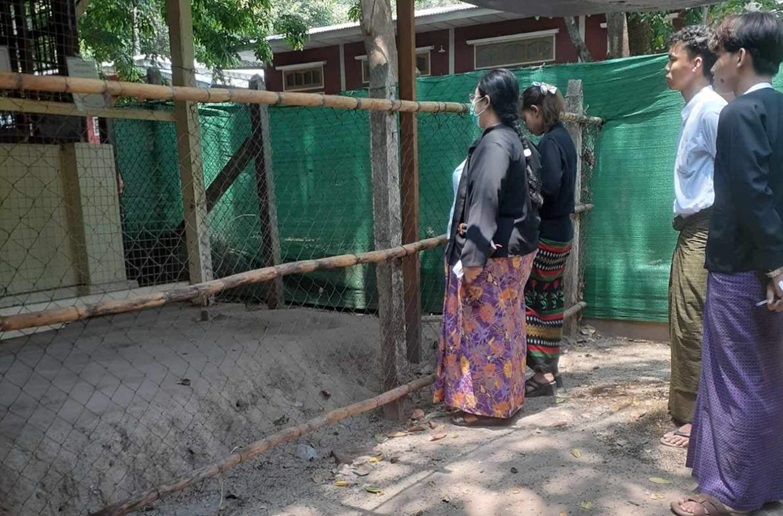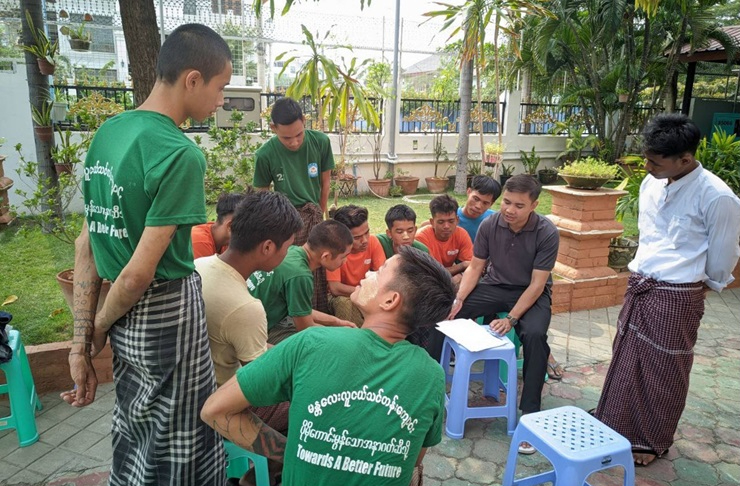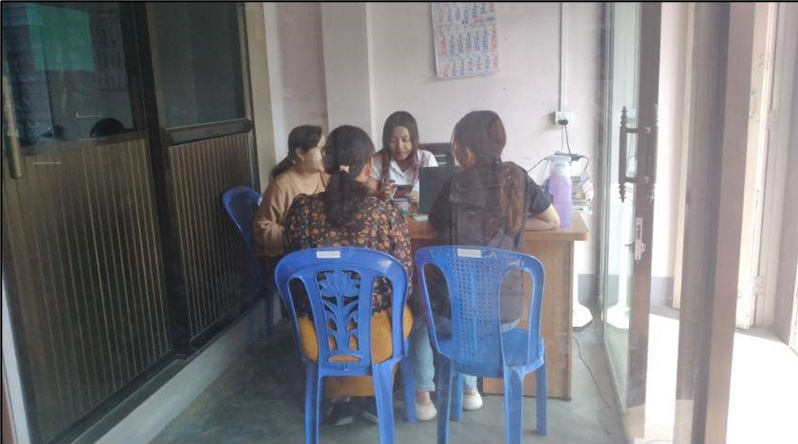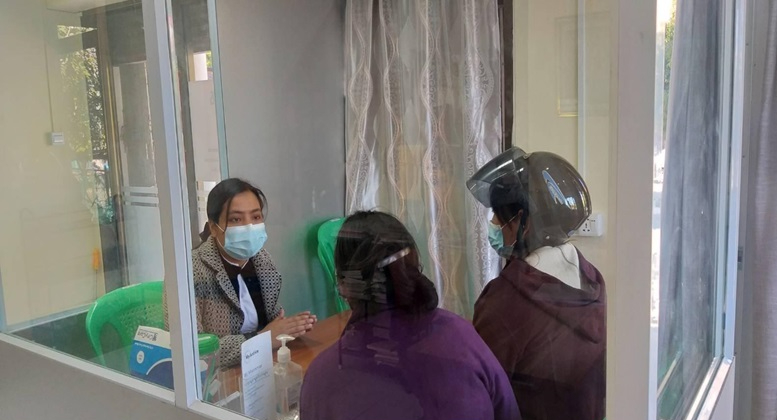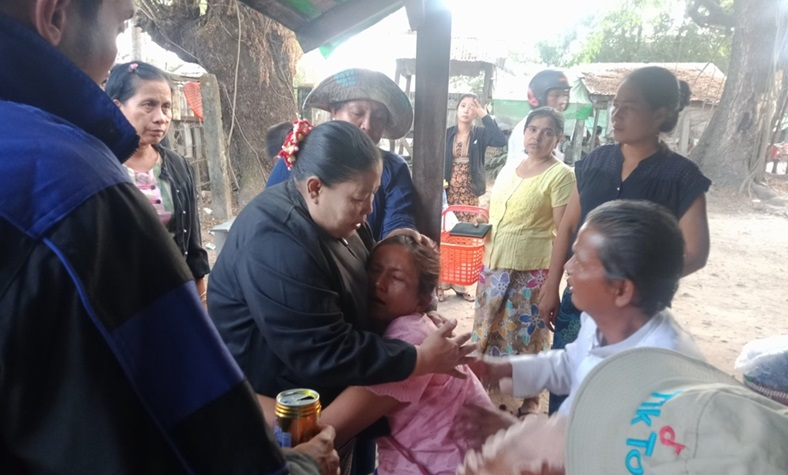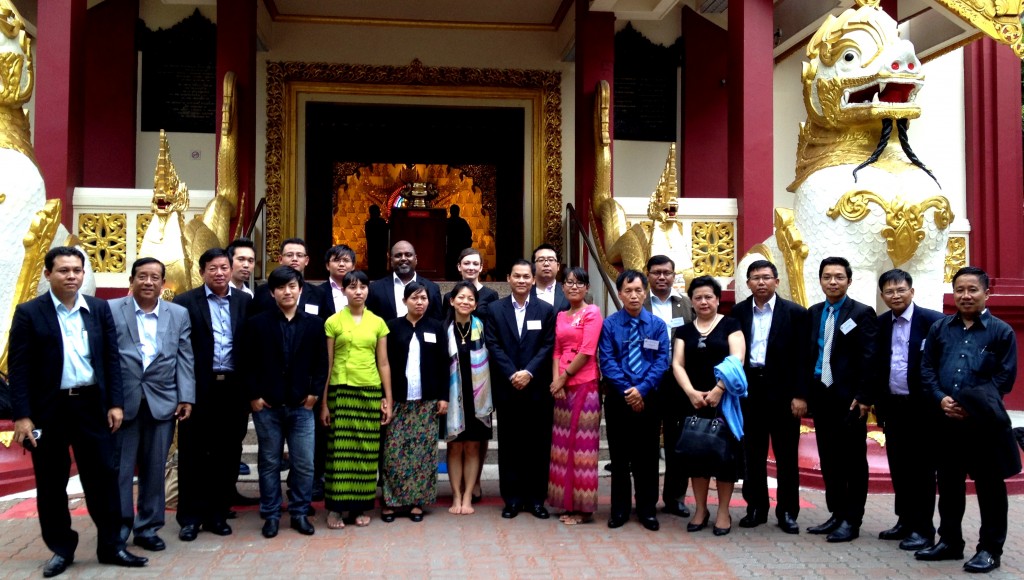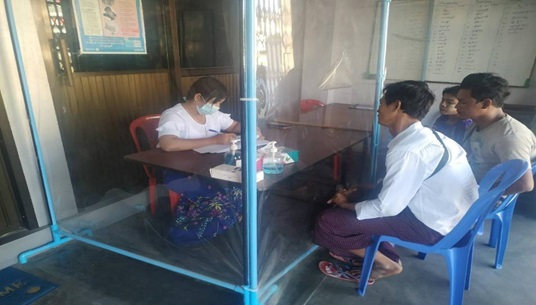International Bridges to Justice (IBJ) is a pioneering provider of legal aid in Myanmar. IBJ first visited the country in 2011 and, by 2013, hosted a significant legal aid conference, which marked one of the earliest dialogues between the Myanmar government and civil society on legal aid. In 2017, IBJ established a full country program in Myanmar, which is locally registered as IBJ Myanmar. A former British colony, Myanmar has a post-colonial history of military government. Myanmar presents a very challenging legal and political environment. However, throughout, Myanmar has had a strong civil society movement and in 2011 there was an initiative towards democratisation and good governance. With the guidance of IBJ’s international staff in Geneva, IBJ-Myanmar established 5 justice centers, hubs strategically placed in important cities throughout Myanmar. Justice centres were established in Mandalay, Naw Pyi Taw, Taunggyi, Taungoo, and Hpa-An IBJ-Myanmar quickly established itself as a leader in providing early legal representation in criminal cases pro-bono. Each of the justice centres expanded the reach of its services through the creation and support of a pro-bono network of lawyers willing to provide no cost legal representation. As of 2023, IBJ-Myanmar’s pro bono network has a total of 187 lawyers.
In February 2021, Myanmar’s military took over the government. The ushered in a period of civil conflict instability. As a result, the role of our Justice Centres became crucial in defending many accused persons including those who took part in protests of civil disobedience movement. The military takeover has had a profoundly negative impact on Myanmar’s already challenged criminal justice system. Current regime has suspended constitutional rights for the defendants limiting their due process and fair trial rights. As a result, many have been detained in military camps.
In the aftermath of the military takeover there were high-profile examples of IBJ’s commitment and courage. February 2021 was fraught with pro-democracy protests, which resulted in many people being arrested and mistreated. IBJ lawyer were the vanguard in representing and obtaining release of protesters. In one such case, 82 people including 15 juveniles were held in custody for engaging in peaceful demonstrations. IBJ lawyers were able to obtain the release of all the juveniles and most of the adults involved in the protest. Another high-profile example of IBJ-Myanmar’s pro-democracy advocacy in representing political cases was its representation of the former Bago State Prime Minister. The lawyers involved in the defence of this case stood up to harassment and threats to their security in providing zealous representation of a defendant.
PowerPoint Introduction to IBJ Myanmar
Success Stories:
Defending rights of children amidst the oppressive Counter-terrorism Law
In November 2023, the Taungoo Justice Center undertook representation of a woman and her sixteen-year-old daughter, both accused under Section 52(a) of the Counter-Terrorism Law.
Click here to read the rest of the story
The minor, accompanied by her mother and three-year-old sister, was apprehended during village agricultural activities amidst a military operation. Although the father was absent from the home, he reportedly was linked to the PDF, and this guilt by association was enough to link the mother and daughter to the PDF. The mother was accused of aiding the PDF as a cook.
Despite the political nature of the charge, the lawyer advocated for the prioritization of the best interests of the child. During the charge-framing hearing, the Yedashe township judge hinted at the possibility of conditional bond. Facing obstacles such as the father’s absence and the mother’s detention, the Justice Center lawyer argued for police bail for the adolescent. The attorney identified the minor’s grandmother as being a responsible adult who could take custody of the child, and this facilitated her release. Both the township judge and the justice center provided crucial support to the detained family, demonstrating their continued commitment to aiding those in need. While the defendants in this case were not subjected to torture, the family encountered military threats during arrest.
In February 2024, a significant legal victory was achieved. A justice center lawyer successfully advocated for a minor’s restoration to her grandparents’ custody under Section 89(c) of the Child Rights Law. The client was charged under the Counter-Terrorism Act. She had been detained with her three-year-old daughter, who was, of course, also restored to the care of the grandparents. The juvenile was released on a one-year bond. The case was a significant step towards familial stability and the protection of child rights even in the face of politically charged circumstances. The case also demonstrated that courts could be convinced to properly apply the principle of “detention as a last resort” in juvenile cases.

Restoring Family Bonds: A Legal Triumph for Mother and Daughter
In Naypyitaw, where IBJ’s justice center stands as the region’s only legal aid provider, a determined effort led to the reunification of a mother with her daughter after years of separation.
Click here to read the rest of the story
The justice center, strategically positioned to handle Supreme Court cases, became a beacon of hope for Daw Nan Saw, who faced an uphill legal battle to regain custody of her child.
The story began when Daw Nan Saw, struggling financially after her husband left in 2017, entrusted her 6-month-old daughter to family friends under a mutual agreement. However, her trust was betrayed when these friends transferred the child to another couple, U Zwe Aung and Daw May Cho, without her consent. When Daw Nan Saw returned to Hlaing Tharyar township six months later, she discovered that her daughter was in the custody of this couple, who refused to return her.
In 2018, Daw Nan Saw took legal action, filing a complaint to restore custody of her daughter. The primary court ruled in her favor, recognizing that the defendants had no legal grounds to keep the child. However, the defendants were relentless, appealing the decision to the Yangon High Court in 2023. The High Court upheld the lower court’s ruling, yet the defendants persisted, taking their case to the Supreme Court.
With no means to afford legal representation at this critical juncture, Daw Nan Saw turned to the Naypyitaw justice center for help. Center Manager Daw Wint Wint Aye stepped in, taking on the case with unwavering dedication. She carefully analyzed every detail and crafted powerful arguments for the Supreme Court, determined to secure justice for Daw Nan Saw and her daughter.
Thanks to Daw Wint Wint Aye’s meticulous preparation and advocacy, the Supreme Court upheld the decisions of the lower courts, dismissing the defendants’ final attempt to keep the child. This victory was not just a legal win; it marked the end of a long and painful journey for Daw Nan Saw, who was finally reunited with her daughter.
This case highlights the profound impact of skilled legal representation in ensuring justice, especially for those who cannot afford it. The tireless efforts of the Naypyitaw justice center and Daw Wint Wint Aye not only secured the return of a child to her mother but also reinforced the importance of legal aid in protecting the rights of vulnerable individuals.
Helpline Services in combatting Human Trafficking and Safeguarding Labour Rights
In Hpa-an, a client sought assistance from HPN Justice Center following the tragic death of her son, who was legally working in Malaysia. To facilitate the compensation process related to her son’s death, she reached out to the center for help.
Click here to read the rest of the story
The helpline lawyer engaged with various entities, including the village administrator, immigration department officers, and relevant authorities from the Ministry of Foreign Affairs, Consular and Legal Affairs Department, National Interest Section, both in person and via phone.
Communication was established through email and phone calls to ensure a smooth transfer of money from Malaysia. Additionally, to cover the client’s travel expenses to Naypyitaw, contact was made with the Tanintharyi Karen Peace Support Initiative (TKPSI), securing an expense of 300,000 MMK. As a result of these efforts, the client has received the insurance related to her son’s death, showcasing the positive impact of helpline services in navigating complex situations involving human trafficking and labour rights.
Impact in Numbers:
- 9k+ people provided with legal representation
- 2,7k+ lawyers trained
- 900+ justice officials trained through roundtables
- 25k+ people reached through rights awareness campaigns
- 5 Defender Resource Centers
- 12 eLearning Modules created

Map:


IBJ Myanmar Annual Reports :
Defender resources:
We provide training, tools, manuals and eLearning, developed with our partners, funded through grants, and resourced through pro-bono assistance.
- Defender Manual – Criminal Defender ToolKit – English
- Defender Manual – Criminal Defender ToolKit – Burmese
For more information on IBJ Myanmar programming, please contact International Program Director Sanjeewa Liyanage at sliyanage@ibj.org
Since the State of Emergency:
Since the Myanmar military declared a State of Emergency on February 1, 2021, IBJ Myanmar has continue its work. Despite Internet cuts, daily internal discussions continue apace using the Signal app, and IBJ-Geneva is providing enhanced support for IBJ Myanmar. All of IBJ Myanmar’s administrative and programmatic staff, as well as its 21 staff lawyers, have been provided written guidelines on:
- The emerging political context and the State of Emergency
- Status update on communications, movements and transportation
- IBJ points of contacts during emergencies
- Personal security
- Security of data and assets at Justice Centers
- External communications and social media
- Continued compliance with COVID-19 precautions
Further, IBJ has conducted an online legal training for all its Justice Center lawyers on, Best Practices and Strategies for Defending Accused during Emergency Situations. The trainer was a defense lawyer with over 30 years of practice experience at local and international levels, including assisting Cambodian lawyers on the ground during the 1997 transfer to military rule.
In 2023, IBJ developed another publication entitled Practice Tips for Representing Women Detainees, in cooperation with Lexis-Nexis, which provided guidance to lawyers and human rights advocates for protecting the rights of women, children, and LGBTIQ clients in conflict with the law. These resources are widely and freely available through IBJ’s online portal.
Finally, IBJ has prepared a comprehensive primer in Burmese for distribution entitled Practice Tips for Representing Clients During the State of Emergency in Myanmar. This politically neutral primer was written to aid lawyers and other legal professionals to provide appropriate legal aid during the State of Emergency, compliant with the law and ethical codes. Legal interpretations and possible lawful legal defense strategies are provided for those accused of offenses, including:
- Offenses Against the State
- Holding an Assembly or Procession Without Notification
- Violation of the Natural Disaster Management Law
- Offenses Affecting the Public Health, Safety, Convenience, Decency and Morals
- Violation of the Telecommunications Law
- Criminal Intimidation, Insult, and Annoyance
- Offenses Against Public Tranquility (unlawful assembly or rioting)
This primer will be distributed to IBJ Myanmar’s staff lawyers, 100+ Community of Practice lawyers, as well as broader legal community. The Primer is available in Burmese and English.
IBJ’s Approach:
IBJ Myanmar’s work focuses on its four core mission objectives:
Providing free, quality legal aid:
The IBJ-Myanmar program has courageously progressed its work in a challenging environment after the military takeover in 2021. The political chaos was of course complicated by the Covid-19 health crisis, which was raging prior to the military takeover and continued well into 2022. IBJ-Myanmar faced down the security challenges created by the dual crises. Myanmar’s government-supported legal aid boards simply collapsed after the military takeover. IBJ-Myanmar stepped to fill the leadership gap created by this gap in legal services. IBJ became the leading legal aid service willing to take on sensitive cases. Up until 2023 IBJ-Myanmar lawyers have provided legal representation to over 6,000 individuals. Over 1,256 of these cases have been political in nature. IBJ-Myanmar developed policies and procedures for dealing with the security threats created by the government, as well as the threats that arose from the COVID-19 crisis and the dangers produced by the civil conflict. IBJ lawyers have fought hard for their clients and have had success throughout the time and especially since the military takeover. They are guided by the fundamental IBJ principle that the presence and involvement of a lawyer at as early as stage as possible in a criminal case is essential to safeguard fundamental rights and prevent maltreatment of prisoners. IBJ-Myanmar lawyers are committed to holistic representation of their clients, understanding that people in conflict with the law require more than legal advice, and may need medical, financial, psychosocial services in addition to legal services. In the aftermath of the military takeover there were high-profile examples of IBJ’s commitment and courage. February 2021 was fraught with pro-democracy protests, which resulted in many people being arrested and mistreated. IBJ lawyers were the vanguard in representing and obtaining release of protesters. IBJ lawyers represented a Polish journalist whose photographs and reporting about the protests. In another case, 82 people including 15 juveniles were held in custody for engaging in peaceful demonstrations. IBJ lawyers were able to obtain the release of all the juveniles and most of the adults involved in the protest. Another high-profile example of IBJ-Myanmar’s pro-democracy advocacy in representing political cases was its representation of the former Bago State Prime Minister. The lawyers involved in the defence of this case stood up to harassment and threats to their security in providing zealous representation of a defendant.
Capacity Building of Defense Lawyers:
IBJ-Myanmar’s leadership has also been demonstrated by its work in building the capacity of the legal profession in Myanmar. IBJ conducts training, mentoring, communities of practice and distributes lawyer education material developed to the public online. IBJ has produced extensive training and mentoring sessions on a wide range of subjects important to criminal defence. Publications are another significant IBJ-Myanmar contribution to building the capacity of Myanmar lawyers. In 2019, IBJ published Myanmar’s most comprehensive general reference source about criminal law, its Criminal Defence Practice Manual. In 2023, IBJ developed another publication entitled “Practice Tips for Representing Women Detainees”, in cooperation with Lexis-Nexis, which provided guidance to lawyers and human rights advocates for protecting the rights of women, children, and LGBTIQ clients in conflict with the law. These resources are widely and freely available through IBJ’s online portal.
Stakeholder Outreach and Civil Society Engagement:
A paramount objective of IBJ’s work is producing long-term systems change through advocacy aimed at government and justice system stakeholders. Despite adverse political conditions, outreach to government and justice system stakeholders has been essential to IBJ’s mission in Myanmar. IBJ Myanmar engages with key justice stakeholders, including legal aid mechanisms, police, penitentiaries, and civil society, to enhance access to justice. Since February 2019, IBJ has had a Memorandum of Agreement with the Union Legal Aid Board (ULAB), working closely with local LABs. IBJ also works with Social Welfare Departments to support accused and convicted juveniles under the new Child Rights Law. The organization has developed relationships with prosecutors, police, and prison leadership, using roundtables as a primary tool to advocate for human rights protection and legal reform. These events, which brought together government and justice system stakeholders, continued until the military takeover and the COVID-19 pandemic made high-level engagement impossible. Despite these challenges, IBJ has persisted in its advocacy. In 2021, IBJ led efforts on drug law reform through training and forums. Roundtables with professionals interested in legal reform and human rights protection were held in 2022. In 2023, IBJ organized a roundtable webinar with 101 participants to launch its publication “Practice Tips for Representing Women Detainees,” raising awareness of the issues addressed in the publication. IBJ lawyers have also engaged in strategic litigation to challenge procedural rights violations and unjust substantive laws in Myanmar, all aimed at achieving long-term systemic change.
Public Rights Awareness:
IBJ recognizes that an informed public is a powerful pro-democracy tool. IBJ-Myanmar has produced rights awareness activities, including IBJ’s signature Know Your Rights (“KYR”) and Focused Group discussion (“FGD”) events. IBJ lawyers have conducted KYR events informing the public about criminal justice and non-criminal justice topics. To supplement awareness efforts, IBJ developed, translated, printed, and distributed pamphlets focusing on basic fair trial rights and access to justice. The Focus Group Discussion (FGD) format facilitates in-depth discussions during KYR events. Another essential component of IBJ’s public outreach has been IBJ’s Legal Helpline. It is a service that adds enormous value to Myanmar society by providing solid legal guidance on a host of legal subjects. In addition, IBJ has developed its Myanmar Justice App, a mobile phone application that will make referral services and Legal Helpline advice even more easily accessible to members of the public.





